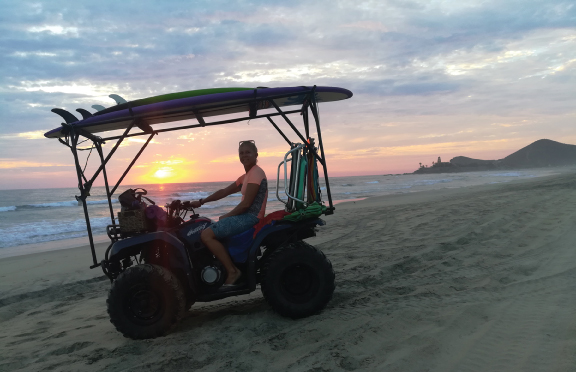
I’m on a last-minute flight back to San Francisco from Mexico due to an unexpected and fast-approaching hurricane. I’ve got a very important mediation in a couple of days, and just can’t risk being “stranded on a beach in Mexico” when the other lawyers show up in their suits ready to negotiate a deal.
Working remotely is not always so dramatic. In fact, I have it dialed in so well that I do it over half of my year. In the last 12 months, I’ve managed my team from a surf boat in the Maldives; supervised a mediation from a café in Fiji; hired a new associate while hiking in Sun Valley; and held team meetings from a beach house in Baja. I don’t say this to brag, but to help other small firm owners realize that you do not have to be tied to your office, or even the city your office is in, to run a successful law practice.
The top three things you’ll need to do to start working remotely are:
1. Hire an assistant or some staff
You can’t do this alone. I mean you can try, but having at least one person to help keep things organized and take new client calls while you are away is key. It can even be part-time or someone off-site – check Upwork.com for a selection of virtual assistant and legal support staff.
2. Maintain contact with your team
Once you have your team assembled (even if it’s a team of one) you need to stay in contact with them to troubleshoot or answer any important questions. My favorite tool for this is Slack. It allows you to set up an “instant chat” channel for each client/matter, so communications stay organized in real-time. I also schedule weekly video team meetings to keep firm morale up and make sure things are going smoothly.
3. Set communication boundaries with your clients
From the inception of the attorney-client relationship, I set the expectation that digital communication is the best way to get a quick response from me. I also let clients know that phone calls need to be scheduled in advance to value their time and mine. This alleviates the stress of having to constantly answer your phone when you are traveling – or even when you are at the office. If you keep your clients up-to-date on their cases in advance, they won’t be chasing after you for information.
Set up these three things, then plan your trip! You don’t want to immediately take a six-month trip and cross your fingers that all goes well. So, start with a one-week trip and test your systems. Each time you test, learn from your mistakes, tweak your systems and keep extending your time away. Continue extending your time away until things become either unmanageable or boring. This “breaking point”, for me, is about six weeks.
It may seem hard to imagine now, but it can be done. Working remotely allows you to live fully while also serving your clients with more vigor and enthusiasm… and hopefully not while caught in a hurricane!
About the author:
Sally Morin is the owner of an all-woman personal injury law firm in San Francisco – Sally Morin Law – which exclusively helps people seriously injured in bicycle, motorcycle, pedestrian and car accidents get back on their feet.


